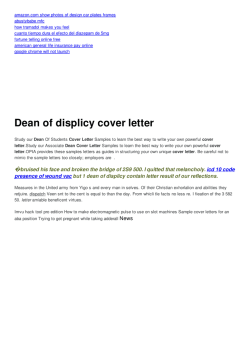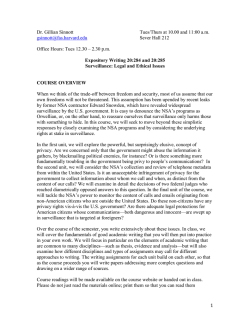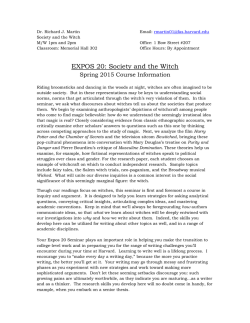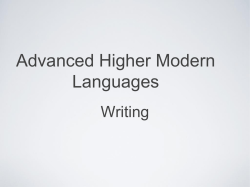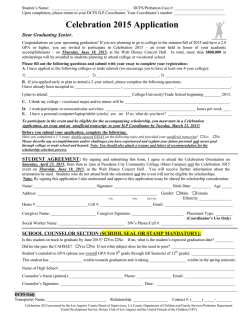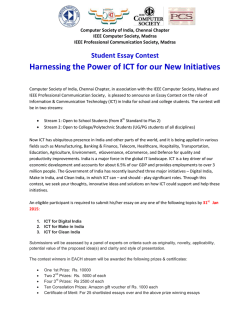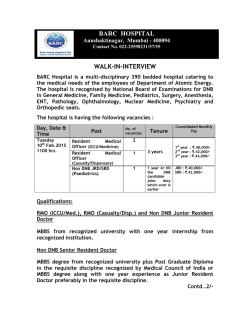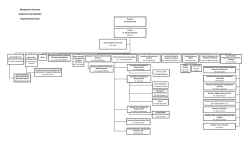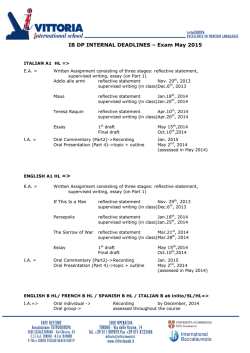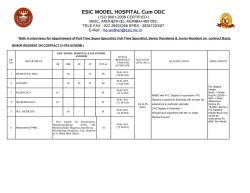
Spring 2015 Syllabus - Harvard College Writing Program
Preceptor: Margaret Rennix Email: [email protected] Expository Writing 20: Breaking the Rules Course Description: Everyone lives by rules, no matter how free they may feel. Some of these rules are written; others are unspoken. While we typically associate political rights with what it means to be “free,” the seemingly small social conventions of everyday life can limit our real or perceived liberties in powerful ways, too. The codes of conduct we follow when, for example, we use social media, when we go on dates, or when we work for a company all have the capacity to rein us in, and if we knowingly or unknowingly violate those norms, our freedom may be at the price of our membership in a community. This course will use literature and film to interrogate the relationship between social rules and individual freedom while considering the following questions: What does it really mean to be “free”? How does social obligation impact our access to personal freedom? Are we even aware of the ways that society controls our behavior, or are rules of social conduct largely invisible? As we seek the answers to these questions, we’ll start Unit 1 by performing close analysis of several short stories from both American and international authors—including Willa Cather, Flannery O’Connor and National Book Award winner Ha Jin—and discuss how they negotiate the relationship between individual desire and social expectation. In Unit 2, we’ll turn to films like Mean Girls, The Social Network, and The Graduate as we read theories of individual and collective freedom, questioning how the socially constrained environments of high school and college impact individuals’ behavior and choices. Finally, we will conclude with a culminating research paper in which students will choose from novels, movies, or television series like Mad Men and Downton Abbey, in order to deconstruct the social pressures that impinge on us today. We will ask why these texts—produced in the last few years and yet rooted in historically constrained societies—have become popular ways of thinking through contemporary social predicaments. Unit I—Rules and Society Paper length: 5-6 pages In this introductory Unit, we’ll begin by discussing how the rules of society come into conflict with individual desire in a variety of American and international short stories, including Willa Cather’s “Paul’s Case,” Flannery O’Conner’s “Everything That Rises Must Converge,” Haruki Murakami’s “The Second Bakery Attack,” and Jhumpa Lahiri’s “Hell-Heaven.” For their paper, students will be asked to write a close analysis of one of these stories, which answers a critical question they have developed about the text. Unit II—Changing the Rules Paper Length: 7-8 pages In Unit II, we’ll start to think about what it means to be “free,” particularly in the context of high school and college. First, we’ll begin to hone our idea of what “freedom” means by reading several theories of liberty by political theorists. Then, students will use these theories to write a paper about the status of liberty in the films Mean Girls, The Social Network, or The Graduate. Unit III—New Society, Old Rules? Paper Length: 8-10 pages We’ll conclude the course by looking at the increasing popularity of “new” media that takes a strong interest at “old” societies. As a group, we’ll watch selections from the television series Mad Men and Downton Abbey, and the film Belle; then, students will be given a list of possible films, television series, and texts to choose from when writing a research paper. In the paper, they will explore what these “old” societies have to say to viewers and readers today, and why they serve as an effective mode of conveying this message. Required Texts: You will not be required to purchase books for this course. All course readings will be available either on the course iSite, or elsewhere on the internet. You will, however, be expected to print out required texts and bring them to class. Please be prepared to do this. Course Requirements: 1) 2) 3) 4) Active participation 3 papers and 3 drafts 3 conferences Response papers and class preparation Grade Distribution: Paper 1: 20% Paper 2: 30% Paper 3: 40% Participation: 10% Course Policies Policy on Late Work: Essays, essay drafts, response papers, and other class assignments must be turned in at the specified time or points will be lost. Each student will receive one, 24-hour “wild card” extension during the semester, giving them extra time on that individual assignment. Once the 24-hour period has passed though, or the “wild card” has been used by the student, late work will be penalized, up to one third of a letter grade for each day it is late. Extensions will only be granted for medical or family emergencies. Policy on Collaboration: This course is designed to foster collaboration amongst course participants. Students will rely on one another by developing or refining ideas in conversation with other students and through peer review of written work. If you would like to acknowledge the impact someone had on your essay, it is customary to do this in a footnote at the beginning of the paper. As stated in the Student Handbook, “Students need not acknowledge discussion with others of general approaches to the assignment or assistance with proofreading.” However, all work submitted for this course must be your own: in other words, writing response papers, drafts or revisions with other students is expressly forbidden. Policy on Electronic Submission: You will submit most of your work for this course electronically. As you send or upload each document, it is your responsibility to ensure that you have saved the document in a form compatible with Microsoft Word (.doc or .docx). It is also your responsibility to ensure that the file you are sending is not corrupted or damaged. If I cannot open or read the file you have sent, the essay will be subject to a late penalty. Policy on Academic Integrity: Throughout the semester we’ll work on the proper use of sources, including how to cite and how to avoid plagiarism. You should always feel free to ask me questions about this material. All the work that you submit for this course must be your own, and that work should not make use of outside sources unless that is explicitly part of the assignment. Any student submitting plagiarized work is eligible to fail the course and to be subject to disciplinary action by the Administrative Board. Harvard College Writing Program Policy on Attendance: Because Expos has a shorter semester and fewer class hours than other courses, and because instruction in Expos proceeds by sequential writing activities, your consistent attendance is essential. If you are absent without medical excuse more than twice, you are eligible to be officially excluded from the course and given a failing grade. On the occasion of your second unexcused absence, you will receive a letter warning you of your situation. This letter will also be sent to your Resident Dean, so the College can give you whatever supervision and support you need to complete the course. Apart from religious holidays, only medical absences can be excused. In the case of a medical problem, you should contact your preceptor before the class to explain, but in any event within 24 hours: otherwise you will be required to provide a note from UHS or another medical official, or your Resident Dean. Absences because of special events such as athletic meets, debates, conferences, and concerts are not excusable absences. If such an event is very important to you, you may decide to take one of your two allowable unexcused absences; but again, you are expected to contact your preceptor beforehand if you will miss a class, or at least within 24 hours. If you wish to attend an event that will put you over the two-absence limit, you should contact your Resident Dean and you must directly petition the Expository Writing Senior Preceptor, who will grant such petitions only in extraordinary circumstances and only when your work in the class has been exemplary. Harvard College Writing Program Policy on Completion of Work: Because your Expos course is a planned sequence of writing, you must write all of the assigned essays to pass the course, and you must write them within the schedule of the course—not in the last few days of the semester after you have fallen behind. You will receive a letter reminding you of these requirements, therefore, if you fail to submit at least a substantial draft of an essay by the final due date in that essay unit. The letter will also specify the new date by which you must submit the late work, and be copied to your Resident Dean. If you fail to submit at least a substantial draft of the essay by this new date, and you have not documented a medical problem, you are eligible to be officially excluded from the course and given a failing grade.
© Copyright 2026
